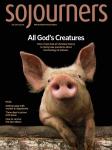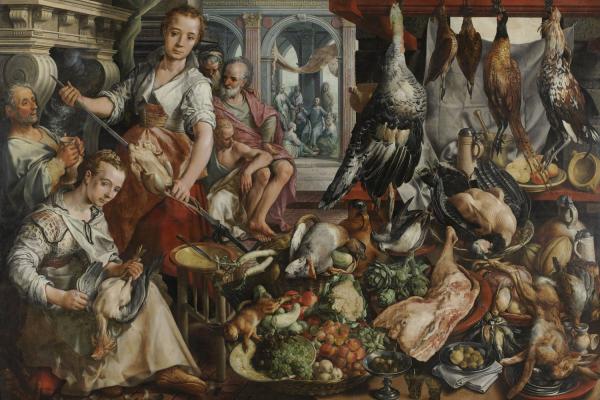THE “DOG DAYS” OF SUMMER refers to more than the weather. Attendance in churches is often down due to travel. The energy level is low, with students away and families scarce. The church year tends to gear up with the academic one, to peak with Christmas, to peak again with Easter, and then to peter out into the summer. How do we stay invigorated? How do we energize our faith with the zeal of the psalmist: “Come and see what God has done: God is awesome in deeds among mortals” (Psalm 66:5)?
I challenge churches to do something different with the summer—turn the dog days into an excuse to take risks. “Something different” will differ with context. Try a dialogue sermon. Answer live tweets from the youth. Preach a sermon entirely in the interrogative mood—nothing but questions or one that, like the psalms, is addressed solely to God. Invite testimonies about faith and service. Invite mentors who inspired you into ministry to offer their story during worship or Bible study. With the elections coming, talk about how the church has engaged with politics through history—and don’t leave out the bad stuff. Immerse yourself and your community more deeply in the gospel for the renewal of your life together, always an aspect of church and worship.
Summer is often a season of travel and meeting strangers. Remember that Abraham and Sarah offered extravagant kindness when they met three strangers in the desert. How can we become known, like Abraham, as “the friend of strangers”?
[JULY 3]
A Livable Faith
Isaiah 66:10-14; Psalm 66:1-9; Galatians 6: 1-16; Luke 10:1- 11, 16-20
ST. AUGUSTINE describes breast milk as a sign of the goodness of God. Who would dare say he’s wrong? It’s so there—abundant, nurturing, creating intimacy. It’s like God with all of us. But Augustine isn’t being original here. Isaiah is. God is a nursing mother, Israel is a nursing child, and both are happy with one another.
Eugene Peterson has made a career of insisting on the “livability” of scripture. We can do this stuff—with a healthy dose of the Spirit’s power. Coastal Church, a Pentecostal congregation in downtown Vancouver, made Luke 10 a sort of constitution for its life together. Rather than preach or protest at people, it has made a point of visiting people’s homes (already difficult in an age that loves privacy). They offer blessing. They ask what hurts and pray for it. They eat together. And they speak of the reign of God. The church has grown, lonely neighbors find surprising friends, and the reign is manifest.
What if we also treat Galatians 6 as livable? Restoring transgressors, gently bearing burdens, crucifying our old selfish desires for advancement and going out of our way instead for the neediest neighbor. That would be an encroachment of friendship in the midst of the anonymous and angry mob that is our culture. And it is eminently livable. It might even be fun.
[ JULY 10 ]
The Fine Print?
Deuteronomy 30:9-14; Psalm 25:1-10; Colossians 1:1-14; Luke 10:25-37
ONE OF THE unfortunate stereotypes about faith is that it presents impossible-to-keep rules designed to stop anyone, anywhere, from having any sort of fun. Deuteronomy is already hard at work to undo this myth. Deuteronomy has presented God’s laws, precepts, ordinances—the way God would have a holy people live. Israel traditionally counts 613 of these commandments. They are not onerous. They are life-giving. They make for thriving, flourishing joy. God is not tragically far away and God has not set the bar too high for us: “The word is near you, on your lips and in your heart” (Deuteronomy 30:14; see also Romans 10:8).
In fact, one thing faith constantly does is critique itself. Try to criticize God’s people all you want—you’ll never be as scathing as the prophets in the Bible are of God’s people. Jesus joins the prophets with stories such as the Good Samaritan. A lawyer unsatisfied with the gentleness of Deuteronomy asks for the contractual fine print: “Who is my neighbor?” Jesus responds with perhaps his most famous parable. A priest has a chance to do good to someone abused. So does a Levite. They don’t. Hold your wagging tongue, you Christians. That priest is us. Stop your judging. That Levite is us. The Samaritan who does good is our worst enemy: a sellout, a member of the opposite political party, a terrorist.
That’s the way faith works. It sets up an inside and outside group. And then the Bible insists that only those on the outside are actually in.
[ JULY 17 ]
Friend of Strangers
Genesis 18:1-10a; Psalm 15; Colossians 1:15-28; Luke 10:38-42
THESE TEXTS INVITE homework. Take up the charge to offer hospitality to someone outside your normal circle of family and friends. Report back to your community what you learned about God.
Abraham is our model for this. The extravagant kindness he and Sarah offer to three strangers in the desert is why some churches call the patriarch the philoxenia, friend of strangers. In an age of blanket vilification of immigrants, this would be a risky sort of friendship to imitate. In the heat of the day, these strangers are urged to come, rest, eat, and drink. Abraham runs (who runs in the desert?!). Sarah prepares the fatted calf. This is beyond letting a stranger use the toilet. This is treating strangers like long-lost kin—which, biblically speaking, is what strangers are.
Mary and Martha offer the most famous New Testament story about hospitality. Mary sits and listens to Jesus. Martha serves the gathered community. Both are necessary for us to do. But Martha asks Jesus to intervene and get her sister to help. He won’t. Mary is fully attending to Jesus, their guest. As important as feeding the guest is (and Abraham and Sarah show it supremely important), lavishing attention on him or her is more important still.
The Christian life is a matter of discerning Christ in surprising places—here in the neighbor, elsewhere in the enemy, or even in the mirror. Christ is present in all things—in Christ all things hold together. Church is where we practice seeing Jesus where we didn’t expect, and rejoicing in finding him again.
[ JULY 24 ]
Saving Cities
Genesis 18:20-32; Psalm 138; Colossians 2:6-19; Luke 11:1-13
SODOM AND GOMORRAH are often used as shorthand for a wrathful God punishing “certain sorts” of sins. This Sunday is a perfect chance to correct that error. Elsewhere, Ezekiel 16:49-50 makes clear that Sodom’s sin is failing the poor. But this story in Genesis 18 emphasizes God’s malleability in response to Abraham’s prayers: “God! You’re vain! You don’t want people to think you unjust! You won’t kill ’em all if there are only 50 righteous people in town, will you?” God’s reply? “No, I guess I won’t.” Abraham talks God down to 10. This is a Middle Eastern bazaar. The one praying barters with God, flatters God, manipulates God.
What if we prayed with such ... liveliness?
Jesus teaches us his own sort of prayerful liveliness in Luke’s less-famous version of the Lord’s prayer. Some clauses are left out here, but some distinctive teachings are added. If a friend bangs on your door, you’ll give him something, just to shut him up, won’t you? Which terrible father gives their kid a scorpion or snake instead of an egg or a fish? Even a terrible God will answer better than that.
And we don’t have a terrible God. God longs for us to ask, seek, knock. God may even relent when we try to twist God’s arm, presumptuous as that is of us. God, will you restore civility to our civic life? Will you restore vibrancy to our communities? Will you spread your goodness anew to every part of creation?
[ JULY 31 ]
The Fool’s Life
Ecclesiastes 1:2,12-14, 2:18-23; Psalm 49:1-12; Colossians 3:1-11; Luke 12:13-21
ECCLESIASTES MIGHT be the perfect aid for the summer doldrums. Vanity of vanities, everything is vanity! Of what value is our work, our play, our prayers? None. Robert Jenson once wrote that Friedrich Nietzsche could have spared the world his voluminous fulminations with a single footnote to Ecclesiastes.
Ancient Christians learned from Jews to put Ecclesiastes in relationship to Proverbs and Song of Songs. The Proverbs teach us basic lunch-box wisdom. Ecclesiastes, a middle step, teaches us that any worldly achievement is worthless. Song of Songs teaches our souls the delight of intimacy with God and all God’s friends. This ladder is not climbed just once, but over and over again in our life with God. We constantly forget what’s valuable. We need to remember not to rush after what everyone else rushes after. And we must constantly urge ourselves toward the one thing that actually matters: intimacy with God and all that God has made and longs for.
Luke’s gospel illustrates this perfectly. The fool has a bumper crop and tears down the barns to build bigger barns. None of this is foolish. Here’s what is: not sharing that excess with others. That very night the fool’s life is required, and what does he have to show for it? Some bigger barns that he can’t take with him.
Can you imagine how badly we need Ecclesiastes’ hard scrubbing brush against our malformed desires? A world that degrades the enemy and exalts acquisition needs from us a strong biblical “no.” So too do our souls.
"Preaching the Word," Sojourners' online resource for sermon preparation and Bible study, is available at sojo.net/ptw.

Got something to say about what you're reading? We value your feedback!

